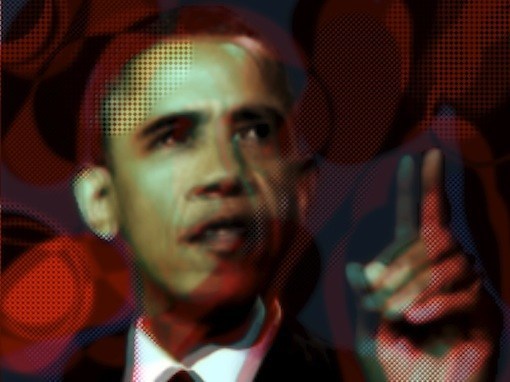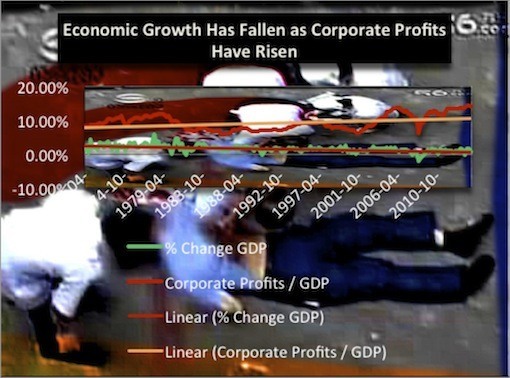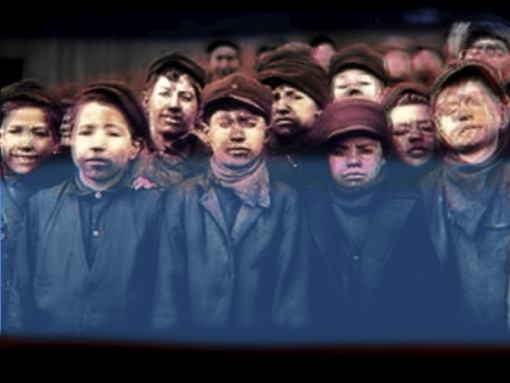Optimism Finds a Cure
After news broke that Senate Democrats had voted against giving President Obama fast-track authority for his TPP (Trans-Pacific Partnership) ‘trade’ agreement there was a moment when true knowledge of the world was held ever-so-briefly in suspension. Eternal optimists of the liberal and progressive persuasions instantly declared that Democrats had acted on, if not quite their moral compasses, at least credible threats from the electorate that their futures as professional collectors of campaign contributions might be at risk. However, upon reading the ‘reasons’ for the vote it became clear that said Democrats were only moving slowly to assure they would be paid their proper tribute for endorsing the deal.
While optimism is certainly within the range of normal human emotions, those expressing it in socially beneficial forms can be found facing down militarized cops in Ferguson, Missouri, fighting mountaintop removal in West Virginia and occasionally burning cop cars in Baltimore. As Senate Democrats were quick to demonstrate, where optimism is never rewarded is in expectations that they will act in the public interest. It took only twenty-four short hours for the graftariat to ready itself to once again conduct the (rich) people’s business. If the fact of the reversal fails to impress, the speed with which it took place certainly should. With the capitalist coup (TPP, TTIP) now so near completion, the call of opposition has been rephrased as it always should have been, to ‘take the politics out of money.’

Above, Barack Obama explains the origin of campaign contributions to slow-learners in the Senate. Earlier trade deals provided incentives to relocate manufacturing jobs to low-wage countries. NAFTA (North American Free-Trade Agreement) contained a version of the ISDS (Investor-State Dispute Settlement) mechanism currently being used by corporations to extort money from sovereign governments for acting in the public interest. From there bank bailouts and ongoing subsidies and guarantees and Federal Reserve policies to boost the value of financial assets held by the very rich have added to plutocratic wealth. Government now works on a commission basis, taking back in campaign contributions a tiny percentage of the public resources transferred to ‘private’ pockets. Original image source: politico.com.
The Power of Positive Larceny
In contrast to the ‘American vision’ of politicians and ordinary citizens alike, if such a thing can be momentarily granted, the world created by writer Gabriel Garcia Marquez is ‘softly’ fluid— poetic rather than deliberately larcenous. While, for instance, an overwhelming preponderance of Americans, including nominally elected representatives, believe in God, from that ‘place’ outward hope finds itself attached to implausibility, to a pre-conscious knowledge that assessed likelihood has little bearing on expected outcomes. In Marquez’s vision outcomes, no matter from whence they emerge, are their own facts. Americans accede to no such logic— belief is the outcome against which ‘the facts’ must be rectified. These facts of studied neglect include the wall, the empty bowl, the police taser, the first kiss and the revolutionary moment.

Graph (1) above: beginning in the 1970s antique capitalist ideology was used to reorganize of the economies of the West. Theory had it that economic growth would rise if economists were given free reign. Left unspecified was precisely where it would rise, and for whom. In the U.S. the rate of economic growth has fallen as corporate profits have taken an increasing share of that which remains. Given the concentrated ownership of corporations, these trends have overwhelmingly benefitted the already wealthy. With the TPP (Trans-Pacific Partnership) and TTIP (Trans-Atlantic Trade and Investment Partnership) being moved forward, claims of past economic success require magical interpretation of actual outcomes. This failure to relate facts to theory suggests that neoliberalism won’t end until it is ended. Data source: St. Louis Fed.
This tendency toward magical interpretation finds itself most firmly attached to modes of analytical reasoning, in particular to economics. If individuals are the fundamental ‘unit’ of society (how else could it be?) and we are rational in a specific mathematical sense (how else could it be?) and we have perfect knowledge in the sense of knowing what we don’t know (how else could it be?), then economists have a theory of how to organize the world for us. This is what our neoliberal minders and ‘their’ elected representatives have put before us with the TPP— a plan of economic reorganization created just for us.* *(The term ‘us’ here is not intended to refer to any actual person or persons either real or imagined. It is a generic term for any grouping of like objects from the perspective of one or more of the constituent objects).
Abstract optimism, like faith, exists in the space between supine fumbling and active engagement. Einstein’s now cliché: “insanity is doing the same thing over and over again and expecting different results” face the limits of real world ‘experiments’ like ‘free-trade.’ Leftish economists have repeatedly made the point that the TPP and TTIP aren’t really trade agreements, but are the formalization of corporate power through supranational tribunals and patent protections. Inferred is that prior trade agreements were something different. Lowering trade barriers and tariffs, part of the alleged purview of earlier trade deals, was never about making labor mobile to match the mobility of capital. And the nation-states that are the signatories (or not) of trade agreements are no more persons, as in ‘partners’ of these so-called partnerships, than are corporations— they represent specific, not ‘national,’ economic interests.

Prohibitions against child labor are premised in part on the idea that children are too young to choose ‘their’ work and therefore too young to ‘benefit’ from it. This idea of free choice is fundamental to the theorized relationship of political to economic freedom. Corporate profits are premised on economic efficiency— the argument that capitalism makes ‘us all’ better off in some cosmic aggregation. If true, why would child labor that produces profits not be beneficial to ‘us all?’ If this isn’t true (writer’s prerogative: it isn’t), why isn’t codifying the terms of exception— basic human rights that take precedence over economistic considerations, the first step of trade agreements? Original image source: thinkprogress.com.
The Logic of the Middle Finger
There exists a logical tension between measured and reasoned language— the form and content of political and economic discourse, and its ‘objects.’ The implied, and occasionally stated, goals of measure and reason are to be ‘effective,’ to persuade those who hold sway over institutional facts that one course or policy is better than another. Left apparently unconsidered is the nature of these institutions, what it is that motivates them? Within the Western liberal frame these are generic questions— what motivates government, business, or the electorate? When considerations move to the particular, to the TPP, racist cops and policing, Wall Street as bailout-dependent economic overlord and global environmental crisis generic questions, and with them generic motivations, lose bearing because they presuppose what they are claimed to describe.

The late Abbie Hoffman makes a measured and reasoned political statement. He wasn’t known for being punctual. Original image source: openingceremony.us.
The optimistic case is that America is in a revolutionary moment. Simple description finds embedded plutocracy intent on widespread immiseration and the wholesale takeover of civil governance to promote its own interests, a military dedicated to creating moral and human catastrophe around the globe, domestic surveillance and policing that are at war with citizens by the degree of their vulnerability, environmental crisis that is becoming increasingly intrusive and potentially catastrophic and a ruling class that believes it has no use for the rest of us. Warriors, politicians, financiers and the police each have their own institutional logics. Reason and measure— statistics, flow-charts, budgets and action plans, are their form. Engagement through the terms given grants base ‘neutrality’ that institutional outcomes render implausible.

Man being tortured at Abu Ghraib. The George W. Bush administration had economistic goals for its torture programs— the stated intentions were to elicit false confessions to support the invasion of Iraq, to gain information with ‘operational’ value in the conduct of the war and / or to convey American indifference to life and human dignity to dissuade resistance to ‘American interests’ through terror. The Obama administration has been just as casual with terroristic murder as the (George W.) Bush administration, if less ambitious in the breadth of its terror campaigns. Original image source: aegisacademy.com.
This isn’t a call for irrationality. It is to ask where the meta-logic, the logic that joins the interests of Afghan villagers about to be bombed with those of the drone pilot about to bomb them, resides? When Barack Obama or George W. Bush have spoken of ‘American interests’ the implied logic is local— it is one group interest against another, not deference to some universal interest. And few but the preoccupied, otherwise engaged and / or intellectually lazy believe that the ‘international community’s’ interest is universal, despite the strategy of posing it as such. The logic of the middle finger then is the refusal of the about to be bombed, the about to be trade-dealed and the about to be beaten and / or murdered by the police to accede to the logic of the bomber, the trade-dealer and the police. And for all of the chatter about embedded plutocracy, the dividing line between ‘inside’ and ‘outside’ remains at institutional behest, as potentially temporary as the accoutrement that serves as social delineation.
Fortune Shits the Bed
Conspicuously missing from the current ‘moment’ is the soundtrack, the anti-commodity of social expression that makes official absurdity visible by offering contrast to it. The institutional panic that hit Senate Democrats when they realized they had momentarily slowed the trajectory of total capitulation to capitalist interests was met by equally panicked interpretation from the cooperative opposition that a crack had appeared that had not been made to appear. House Democrats may or may not pass ‘fast track’ and the TPP but jobs will nevertheless be outsourced, pensions looted, wedding parties in the Middle East bombed and Democrats (and Republicans) will remain craven and self-serving until a different order is established.

Hillary Clinton contemplates existence with fear, loathing and somewhere deep inside, buried interest. Original image source: Mike Coppola / Getty Images.
Most likely assumed, but certainly not on good evidence, is that officialdom is aware of the choices available to it. Once a step is taken outside of the inherited-from-history and the handed-to-us-by paid-apologists, official choices seem less brilliant conspiracy and more dim muddle. The rich may very well get richer, but what a tired farce that is for both the takers and the taken from. A starting retort is the logic of the middle finger— assertion that the given logic won’t be internalized. Another is the bringing forth of the anti-commodity, a cultural revolution to give scope, credence and heart to revolution in the streets. John Coltrane, Ornette Coleman, Jimi Hendrix and the Sex Pistols gave context to official logic by delimiting it, by providing contrast to the dim tedium that is repressive logic.
One other way to put this is that refusal of rebellion is both abrogation and abdication, not because I say so, but because the powers that be make it so. The last half-century has been of singular trajectory, a capitalist coup that cannot escape its internal logic no matter the consequences. Negotiation, always the preferred tactic, can only take place outside of this logic because otherwise the terms are set and negotiation is capitulation. By analogy, the logic of ‘fast-track’ authority is to control the terms so that outcomes are assured. What is negotiation in ‘internal’ terms can only be accepted or rejected in ‘external’ terms— there is no negotiation to it. These are, in fact, the terms that have been ‘offered.’ My counter begins with a raised middle finger— not very sophisticated, but from the heart and to the point. The next move belongs to you.
Rob Urie is an artist and political economist. The images in this piece are reworked from existing images, graphic ‘sampling.’ The approach derives from a social theory of art.